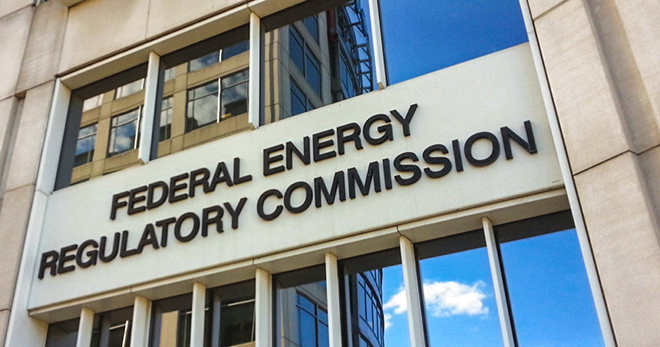S&P Global Offerings
Featured Topics
Featured Products
Events
S&P Global Offerings
Featured Topics
Featured Products
Events
S&P Global Offerings
Featured Topics
Featured Products
Events
Banking & Capital Markets
Economy & Finance
Energy Transition & Sustainability
Technology & Innovation
Podcasts & Newsletters
Banking & Capital Markets
Economy & Finance
Energy Transition & Sustainability
Technology & Innovation
Podcasts & Newsletters
S&P Global Offerings
Featured Topics
Featured Products
Events
12 Jul, 2021

By Zack Hale

|
A new presidential directive on economic competition specifically mentioned the Federal Energy Regulatory Commission. |
A new executive order issued by U.S. President Joe Biden could serve as an impetus for the Federal Energy Regulatory Commission to crack down on anti-competitive behavior while encouraging more wholesale power market expansion, according to industry experts.
The order, issued late July 9, aims to establish a "whole-of-government" approach to "address overconcentration, monopolization, and unfair competition in the American economy." It directs federal agencies, including FERC, to adopt pro-competitive regulations and rescind rules that "create unnecessary barriers to entry that stifle competition."
The presidential directive comes as FERC, which has jurisdiction over interstate gas and electricity sales and transmission facilities, faces growing calls from corporations and climate activists to further the expansion of competitive wholesale power markets to help decarbonize the U.S. power grid.
On July 8, for example, a coalition of consumer advocates and think tanks urged the U.S. Congress to mandate a "detailed and objective study" of U.S. electricity costs, arguing that such a study is "long overdue."
Wholesale power market expansion
Approximately two-thirds of U.S. electricity consumers are now served by FERC-jurisdictional regional transmission organizations and independent system operators, which were formed in the late 1990s and early 2000s to coordinate least-cost generation dispatch and transmission planning.
But most of the U.S. West and Southeast is still dominated by vertically integrated utilities that operate outside of wholesale markets. One study released in August 2020 estimated that establishing a regional transmission organization in the Southeast could save consumers there a total of $384 billion by 2040 while slashing greenhouse gas emissions.
"It has been many years since the commission examined competition in non-RTO regions to consider whether barriers to entry in those markets are similarly leading to potentially unjust and unreasonable rates or undue discrimination," Jeff Dennis, managing director and general counsel for the business group Advanced Energy Economy, said in an email. "With renewed interest from consumers and policymakers in using competitive markets to empower customers and enhance reliability while achieving clean energy objectives, FERC may want to use ... the executive order as an opportunity to look more closely at outcomes in non-RTO regions."
FERC is also set to release a long-awaited proposed rule this week on transmission planning and cost allocation where the agency will open a public docket and seek comments from industry stakeholders. Various studies have estimated the U.S. will need to double or even triple its electric transmission capacity to decarbonize its economy by midcentury, but transmission planning and cost allocation issues present major obstacles to doing so.
"As FERC may consider the scope of its rules mandating competitive transmission development, I'll be interested to see if the [executive order] plays any role," Ari Peskoe, director of the Electricity Law Initiative at Harvard Law School, said in an email.
Affiliate guidelines
Consumer advocates said the July 9 order could give FERC the opportunity to reexamine its merger and acquisition policies following decades of utility-sector consolidation. Tyson Slocum, director of Public Citizen's energy program, said in an interview that the agency should start with reassessing its affiliate guidelines.
Under FERC's current rules, shareholders of utility stocks are not considered affiliates until they control at least 10% of a company's outstanding shares. Slocum has recently intervened in multiple proceedings involving JPMorgan Chase & Co. and Elliott Management Corp., among others, to raise concerns about how financial firms were able to elevate preferred individuals to corporate boards while holding less than 10% of a utility's stock.
Public Citizen also protested FirstEnergy Corp.'s application with FERC to allow two members of its board of directors appointed by billionaire Carl Icahn's conglomerate Icahn Enterprises LP to receive voting rights despite Icahn Enterprises only owning a roughly 3.5% stake in FirstEnergy. FERC is poised to issue an order in that proceeding (EC21-77) at its July 15 open monthly meeting.
"FERC's rules assume that if you own less than 10% of a utility, you can in no way control or influence that utility which is, on its face, a laughable assertion," Slocum said. "We've now got multiple sophisticated financial entities that have way less than 10% — one has 1% — and yet they're getting board seats, they're getting agreements that direct management to do certain things, they're getting access to material nonpublic information."
Beyond mergers and acquisitions, FERC should also look at spot prices of natural gas at trading hubs, Slocum said.
"In some cases, at major spot trading hubs, prices were determined by as little as two trades," Slocum said. "That's not evidence of competition."
A spokesman in Chairman Richard Glick's office said the agency is still reviewing Biden's executive order.
Democrats are set to regain a 3-2 majority on the commission following the expected departure of Republican Neil Chatterjee in the weeks following FERC's July 15 meeting. Potential replacements reportedly include Massachusetts state Rep. Maria Duaime Robinson, D.C. Public Service Commission Chair Willie Phillips and labor union leader Tom Dalzell.
